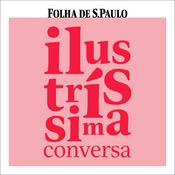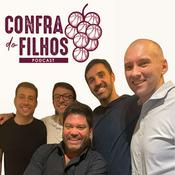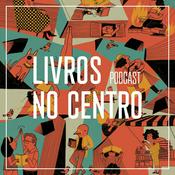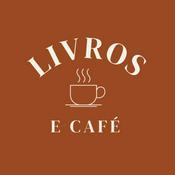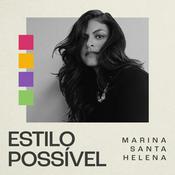130 episódios
Maintaining Creative Habits and Values As the World Changes with Bergen Anderson of Lilla Barn
21/1/2026 | 58minAs people in creative fields, many of us can look back and see how our activities and interests as a child led to the work we do today. We may have grown up and grown out of clothes along the way, but some things never change. Creativity and other values that are important to us show up in our adult life through our fashion businesses.
This is certainly true for today’s guest Bergen Anderson. Her brand, Lilla Barn, makes colorful and sustainable clothes for kids and grownups alike.
As a lifelong sewist, Bergen Anderson started Lilla Barn in order to make colorful, genderless, sustainable, baby clothes that stand out in a world of pinks and blues. In the last 12 years, she has grown her brand to include grown-up clothes, accessories, and homegoods including a storefront/studio in Andersonville, Illinois.
Inspired by visual artists who play with color and texture, her work is intended to bring joy, creativity, and individuality into everyday life. Bergen enjoys exploring the overlaps between traditional craft ("women's work"), modern textiles, and functional fine art. As a slow fashion advocate, she believes the personal is political and that our consumer habits and creating habits should align with our values.
This episode explores:
Fitting the customer
Why Bergen designs what she likes even though she is technically no longer her own target customer
Bergen’s process for patternmaking and sizing and its pros and cons for fit
Fitting the lifestyle
The hardest part about hiring a small team for Lilla Barn
The extent that creative habits are intertwined with personal and business lifestyles
The projects Bergen wants to take on in her business once she has a bigger team
How opening a retail space changed Lilla Barn’s business model
Fitting the values
How to communicate brand values in a way that is meaningful and relevant even as the broader culture changes around us
People and resources mentioned in this episode:
Lilla Barn website
Lilla Barn email
Lilla Barn Instagram
Do you want fashion business tips and resources like this sent straight to your inbox? Sign up for the How Fitting newsletter to receive new podcast episodes plus daily content on creating fashion that fits your customer, lifestyle, and values.Breaking From the Fashion Calendar with Intention with Dana Mortada of dal the label
06/1/2026 | 58minFashion expects a lot from designers. It expects you to release new collections at a set seasonal schedule. It expects you to just know the right people and know where to find a good production partner (because as you know, some of the best factories don’t even have websites). It expects you to show up on social media to sell. These expectations can run your life if you let them.
Dana Mortada doesn’t let them. She gave up the traditional wholesale calendar and the pressure that came with it. Her four-year-old brand, dal the label, now releases new capsules on a flexible schedule that works for her. In episode 128, Dana shares how far she’s come by following intention instead of expectations.
dal the label is a California womenswear brand redefining modern luxury through elevated essentials. Founded by designer Dana Mortada, the brand focuses on timeless, ethical pieces designed in Los Angeles and made to be worn again and again. Each collection reflects a commitment to intentional design, quality craftsmanship, and a slower, more thoughtful way of dressing.
This episode explores:
Fitting the customer
Why simple designs are harder to fit
The marks of craftsmanship that Dana designs for and looks for in clothing
Fitting the lifestyle
Why Dana doesn’t want the traditional fashion calendar to run her life and instead releases capsules whenever she is ready
What makes Dana say dal has come a long way since first launching in 2022
The biggest challenge Dana is trying to solve on the business side
Why Dana moved some of her production overseas
Fitting the values
How long clothes last depends on the designer and the consumer
How Dana answers the question of “does the world need another fashion brand?” based on her values
People and resources mentioned in this episode:
Dal the Label website
Dal the Label email
Dal the Label Instagram
Do you want fashion business tips and resources like this sent straight to your inbox? Sign up for the How Fitting newsletter to receive new podcast episodes plus daily content on creating fashion that fits your customer, lifestyle, and values.Why This Brand Launched Without Social Media and What They Did Instead with Maria Alejandra Alvarado of ZADIMA
18/11/2025 | 58minChanging algorithms, the constant time investment, and, with the rise of AI, even more content to compete with for customers’ attention make many of us want to avoid social media altogether. However, it can seem like a necessary evil. Isn’t every brand on social platforms? But what if staying off socials as a fashion brand isn’t just the right choice for your mental health as a founder, but also for your business strategy?
This is the choice that Maria Alejandra Alvarado has made for her luxury workwear brand ZADIMA. In episode 127, she shares how she’s connecting with people to market her brand instead of competing with algorithms. For Maria, it felt like a natural fit that aligns with her business.
María Alejandra Alvarado is a marketing leader with nearly 15 years of experience shaping brand and product launch strategies for global companies. For the past three years, she’s been building ZADIMA — a brand born from her desire to help modern professionals dress beautifully and intentionally, without adding more decisions to already full days.
Frustrated by the lack of color, personality, and quality in workwear, María set out to create pieces that combine great tailoring, elegant silhouettes, and luxurious Italian fabrics. Each garment is crafted from exquisite Italian deadstock textiles in a woman-owned atelier in Manhattan’s Garment District, designed to make women feel confident, polished, and effortlessly themselves.
This episode explores:
Fitting the customer
The smart questions Maria asked while gathering customer research
The ways that knowing her customer helped Maria make decisions about fabric, designs, and colors
Fitting the lifestyle
How the lifestyle of the Zadima customer shaped the marketing strategy
The practical ways Maria generates word-of-mouth referrals
How Maria represents her brand as the founder
How Maria prioritizes tasks in her business
Fitting the values
Why Maria decided to produce her collection in NY
How Maria uses AI tools in alignment with her relationships and quality-focused business values
People and resources mentioned in this episode:
ZADIMA website
ZADIMA email
Maria’s LinkedIn
Do you want fashion business tips and resources like this sent straight to your inbox? Sign up for the How Fitting newsletter to receive new podcast episodes plus daily content on creating fashion that fits your customer, lifestyle, and values.- In slow fashion, we like being intentional with our clothing choices. We want our wardrobes to be aligned with what we care about and how we live. It is a reassuring kind of intention. Then there is another type of intention that affects fashion founders – the way we intend things to go. We have intentions for the launch, product development timelines, or what it means to be a good founder.
But as anyone who has started a business knows, things don’t always go quite as intended. So how do we balance intention and reality? In episode 126, ARIMMA founder Lucielle Salomon shares how she moved past her assumptions about what it means to be a founder and finally launched her brand. Through the process, she now sees fashion in a new light.
Lucielle Salomon is a Dominican-American founder, fashion editor and storyteller advocating for a slower, more soulful approach to style and business. With a background in journalism and a sharp editorial eye, she blends thoughtful design with meaningful storytelling, inviting her audience to dress with intention, find beauty in the everyday and redefine what success looks like through a values-first lens.
She is the founder of ARIMMA, an on-demand women's wear brand rooted in romantic silhouettes, timeless details and environmental responsibility. Every piece is crafted only after it's ordered—minimizing waste, reducing overproduction and creating space for clothing to be made with care. ARIMMA designs use natural or low-impact materials and are constructed with durability, emotion and longevity in mind.
Through her Substack newsletter, Woven Letters, and growing digital platforms, Lucielle shares a curated blend of sustainable fashion finds, emerging brands, and everyday rituals—from what she's wearing to how she's slowing down. As a mother of two, she also explores the intersection of creativity, motherhood and entrepreneurship, offering a rare behind-the-scenes look at building a conscious business without burning out. Lucielle is available for interviews, panels, collaborations, and essays that explore the future of fashion, identity-driven entrepreneurship and intentional living.
This episode explores:
Fitting the customer
How Lucielle follows feelings, not trends with her designs
The part of development that was the biggest challenge for Lucielle
Fitting the lifestyle
What Lucielle would do differently now if she was starting over
How our mindset can hinder or help us in entrepreneurship
What Lucielle thought a good founder lifestyle should look like and why that didn’t work for her
Why Lucielle didn’t go all out for the launch
Fitting the values
How becoming a founder changed what Lucielle values about fashion
Why Lucielle reached out to factories before she even had designs
People and resources mentioned in this episode:
Arimma website
Arimma Instagram
Lucielle’s Instagram
Do you want fashion business tips and resources like this sent straight to your inbox? Sign up for the How Fitting newsletter to receive new podcast episodes plus daily content on creating fashion that fits your customer, lifestyle, and values. Consistency or Newness: What It Takes To Get To A Decade In Fashion Business with Erin Gray Morton of erin gray
21/10/2025 | 1hNewness builds excitement, but consistency builds trust. Which one will get your brand to a decade in business? Erin Gray Morton just celebrated ten years of her gold-filled jewelry and premium tee shirt line erin gray. The brand has grown to being stocked in over 800 boutiques. To get there, Erin and her team have prioritized relationships while figuring out how to make each wholesale show feel new with basics products that are more timeless than trendy.
In episode 125, hear the ways erin gray builds trust with customers and the boutiques that buy wholesale from them, how Erin keeps herself from a lifestyle of overworking even when she loves what she does, and how Erin structured the business model and pricing from the very beginning to allow giving back to causes she values.
erin gray is a female-owned and operated brand from Atlanta designing elevated essentials with a touch of luxury. Their customers primarily love them for two things: their cult-favorite Pima cotton tees and refined tops that offer high-end style at accessible prices and our 14k gold-filled waterproof jewelry, which wears like solid gold without the high cost.
Erin built this brand from the ground up and the brand is now featured in more than 800 boutiques nationwide. Giving back is our heart - Erin lost her mother to cancer, so supporting cancer research is at the core. The atmosphere at erin gray's Atlanta warehouse is fun, respectful, flexible, family-oriented and customer-focused. The team gets things done without compromising the things and people who matter to them the most.
This episode explores:
Fitting the customer
The ways erin gray builds trust with customers and the boutiques that buy wholesale from them
The effort that went into developing the best basic white tee (because simple is never simple!)
How erin gray creates newness at each wholesale market with a basic, timeless product
Why Erin thinks wholesale shows will never go away
Fitting the lifestyle
What they did differently when erin gray introduced apparel alongside their jewelry line
How Erin keeps herself from overworking even when she loves what she does
How Erin has expanded her team over the years
The benefits of a long wholesale design and development calendar
What to do when you get bored of your product before it even launches
Fitting the values
How Erin structured the business model and pricing from the very beginning to allow giving back to causes she values
Ways your business can give back to causes you care about beyond cash donations
Why customer service is so important for the success of erin gray
People and resources mentioned in this episode:
Erin Gray website
Erin Gray email
Erin Gray Instagram
Erin’s LinkedIn
Do you want fashion business tips and resources like this sent straight to your inbox? Sign up for the How Fitting newsletter to receive new podcast episodes plus daily content on creating fashion that fits your customer, lifestyle, and values.
Mais podcasts de Arte
Podcasts em tendência em Arte
Sobre How Fitting: design a slow fashion business that fits
How Fitting® is the podcast for slow fashion designers who want to create clothing and grow a business that fits their customer, lifestyle, and values. In biweekly episodes, hear how relatable fashion entrepreneurs (the kind who run their businesses from kitchen tables and cutting tables, not boardroom tables) navigate the fashion industry with integrity and define success based on their own principles.
In each conversation, host Alison Hoenes (a freelance women’s apparel patternmaker) explores the things that all slow fashion business owners experience: the vulnerability of launching something new, the deeply empathetic process of designing clothes that fit a niche market, the challenges of pursuing both financial and environmental sustainability, the late nights of reckoning with your values that make you consider shutting the whole thing down, and the rewarding moments that make it all worth it.
In addition, hear from experienced fashion industry resources that are helping indie designers make a difference and a profit – like low MOQ factories, fashion marketing and business coaches, or sustainable fabric suppliers.
How Fitting® offers validation that you are not alone in your fashion entrepreneurship experience, ideas to try on in your fashion business to create a better fit, and a curious look into how other slow fashion brands are making it work. How fitting is that?
Site de podcastOuça How Fitting: design a slow fashion business that fits, Service95 Book Club With Dua Lipa e muitos outros podcasts de todo o mundo com o aplicativo o radio.net
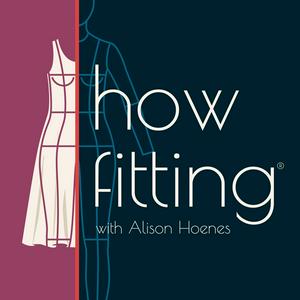
Obtenha o aplicativo gratuito radio.net
- Guardar rádios e podcasts favoritos
- Transmissão via Wi-Fi ou Bluetooth
- Carplay & Android Audo compatìvel
- E ainda mais funções
Obtenha o aplicativo gratuito radio.net
- Guardar rádios e podcasts favoritos
- Transmissão via Wi-Fi ou Bluetooth
- Carplay & Android Audo compatìvel
- E ainda mais funções


How Fitting: design a slow fashion business that fits
Leia o código,
baixe o aplicativo,
ouça.
baixe o aplicativo,
ouça.



